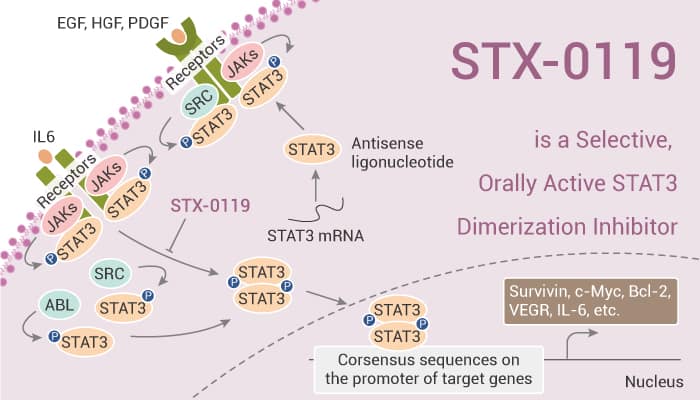STAT3 protein is a potential cytoplasmic transcription factor. Constitutive activation of signal transducer and activator of transcription 3 (STAT3) is related to the proliferation, survival, invasion, and angiogenesis of many human cancer cells. Specifically, it transmits signals of cytokines and growth factors from the cell membrane to the nucleus to regulate the expression of genes crucial to normal cell processes. Besides, phosphorylated and unphosphorylated STAT3 shuttles between the cytoplasm and nucleus. Unphosphorylated STAT3 accumulates in the nucleus in response to cytokines and regulates transcription by binding to NFkB. The methods of inhibiting the homodimerization of STAT3 and regulating its activity have antitumor activity.
Furthermore, constitutive activation of STAT3 involves a wide range of human cancers. Meanwhile, STAT3 will be acetylated by p300 at lysine 685. This is crucial to the formation of stable dimers. Acetylated STAT3 tightly combines with DNA to enhance the transcription of genes necessary for cell growth, thus promoting tumorigenesis. Nonetheless, the acetylation of STAT3 is in tumors. And this promotes tumor progression by inducing DNA methylation at the promoter of tumor suppressor genes. Therefore, using a small molecule method to target STAT3 acetylation may be a potential means of chemoprevention and cancer treatment. Here, we will introduce a selective, orally active STAT3 dimerization inhibitor, STX-0119.
STX-0119 is a Selective, Orally Active STAT3 Dimerization Inhibitor.

Above all, STX-0119 inhibits STAT3 transcription with an IC50 of 74 μM. Importantly, STX-0119 inhibits STAT3 dimerization through direct interaction with the STAT3 protein. It is not via the modulation of upstream regulators such as JAK in HEK293 and MDA-MB-468 cells. Particularly, STX-0119 with 10-50 μM for 24 h reduces the expression of STAT3 target proteins.
Next in importance, STX-0119 with 160 mg/kg/day by oral gavage for 4 days inhibits SCC-3 tumor growth in mice. Obviously, the plasma concentration of STX-0119 is maintained at >100 μg/mL, even at 8 h after administration.
All in all, STX-0119 is a selective, orally active STAT3 dimerization inhibitor.
References:
Matsuno K, et al. ACS Med Chem Lett. 2010 Jul 13;1(8):371-5.